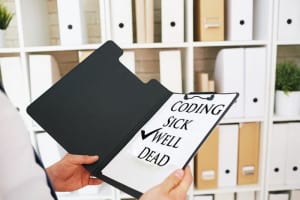
ATLANTA, GA – As the nation’s hospitals and clinics panic over implementation of the ridiculously unintuitive and immensely complicated ICD-10, a stealth council of annoyed health care practitioners has already formed and plans to propose a successor ICD-11 coding system that will feature only three codes: sick, well, or dead.

“As much as I want to use S30.846A for external constriction of unspecified external genital organs, female, initial encounter,’ I think our system will make it much simpler,” explained primary care physician Mark Nelson, a member of the reactionary ICD-11 OMG Committee. “Is my patient sick, well, or dead? That’s all that matters.”
“Honestly, with how complicated our patients are and with all the multitasking and documentation we have to do, I’m absolutely spent by the time I have a moment to sit down and think about billing,” admitted hospitalist Renee Richardson. “My brain is mush when I bill. It needs to be less complicated. The sick, well, dead system is perfect.”
In trial runs, health care practitioners are struggling with the use of ICD-10, as it replaces medical terms with absolute nonsensical gibberish. On average, a health care practitioner needs to devote one hour to ICD-10 per patient, though that doesn’t guarantee that the right code is picked. ICD-10 has been directly linked to massive intracerebral hemorrhages in health care practitioners. Furthermore, since coding takes precedence over patient care as mandated by hospital administrators nationwide, patients should expect to have no more than three seconds of direct face-to-face time with their health care practitioner when ICD-10 rolls out in a blazing hot mess later this year.
According to the latest draft of ICD-11, 1 stands for sick, 2 stands for well, and 3 stands for dead. However, a source of current debate within the ICD-11 OMG Committee focuses on overhauling the 1-2-3 system in favor of an A-B-C system (A stands for sick, B stands for well, and C stands for dead) or even an S-W-D system (S stands for sick, W stands for well, and D stands for dead). Though each system has strong support, everyone does agree on one thing: anything is better than a code system that features R76.12 (nonspecific reaction to cell mediated immunity measurement of gamma interferon antigen response without active tuberculosis). Anything.
“ICD-11 puts the focus back on the patient-provider interaction since billing should only take a matter of seconds,” explains Nelson as he burns his four-million-page manual of ICD-10 codes. “Billing can take a backseat where it belongs. I mean, remember that thing called patient care?” Though GomerBlog does remember that thing called patient care, administrators and insurers have reminded us that patients are merely vehicles to allow billing and profits.
Baffled by ICD-10? Check out our ICD-10 lessons and articles below:
– Lesson 1: Macaw Documentation
– Lesson 2: Roller-Skate Documentation
– Lesson 3: Star Wars Codes
– Lesson 4: Babystroller Documentation
– Lesson 5: WTF Codes
– Lesson 6: OMG Codes
– Lesson 7: The Fortune Cookie “In Bed” Modifier
– Quiz 1: Can You Spot the Y92 Code That Isn’t Real?
– ICD-10 Codes: Dr. Oz Says
– ICD-10 Codes: Crazy
– ICD-10 Codes: Injuries Due to ICD-10
– ICD-10 Codes: Probably a Virus & First Time Mother
– ICD-10 Emojis
– ICD-10 Medical School Curriculum
– ICD-10 & CPT Codes
– ICD-10 & The DaVinci Code
– Opinion: ICD-10 Codes Are Out, What Do You Think?
– ICD-10.2